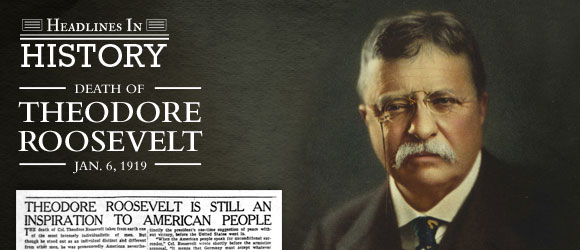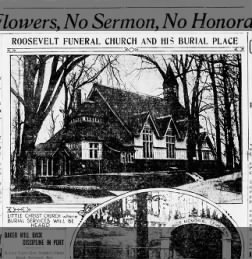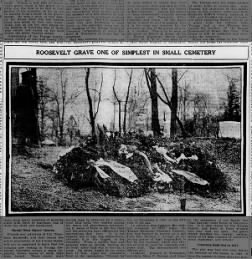

On January 6, 1919, around four in the morning, Theodore Roosevelt quietly died in his sleep at home in New York after a battle with chronic illness that had rapidly worsened in the final months of his life. He was 60 years old.
Roosevelt’s funeral, held two days later, on January 8th, was a small, quiet affair. A short prayer service was held in the family home. Next came the funeral, which took place at a nearby church. Only 500 people were allowed to attend, and there was no music or eulogy. The mourners then followed the casket to the cemetery, where he was interred after the firing of three volleys and the playing of taps. His wife Edith attended neither the funeral nor the burial, instead mourning at home. Two of Roosevelt’s sons, Kermit and Ted, were also absent, as they were still serving overseas in the military.

The nation was largely shocked by Roosevelt’s death. He had kept his illnesses quiet and displayed as charismatic and capable a public face as ever. Once the newspapers learned of his protracted illnesses prior to death, many of them attributed his declining health to grief over the death of his son Quentin, who had been killed during the war. Numerous editorials were published about his life and accomplishments, and though many acknowledged that Roosevelt had been a polarizing and controversial figure, nearly all commemorated him as a patriotic man, larger than life, who had—through skill and passion—achieved so much in so many arenas.
Though very few were allowed to attend his funeral, people honored the former president in other ways. President Wilson ordered the White House flag be flown at half-mast. Newspapers reported that stock exchanges would close and that Congress had adjourned early. The Boy Scouts planted trees in his honor, New York held a minute of silence, trains temporarily stopped running in Illinois as did streetcars in Chicago, some small businesses closed, and towns held their own memorial services.

Though Roosevelt had as many enemies as he did friends, he had an undeniable impact on the nation, living life so energetically that few could keep up with him. Observed vice president Thomas Marshall, “Death had to take him sleeping, for if Roosevelt had been awake, there would’ve been a fight.”
Find many more articles about Theodore Roosevelt’s life and death on Newspapers.com. Or search for other topics that interest you.


You forgot to tell us what his “chronic illnesses” were. We need this basic ingredient if we are to understand what ended his life.
Will Wright
Cranky old retired newspaper editor
Clot in the lung (pulmonary embolism). Often a side effect of a period of inactivity (i.e. being bedridden due to ill health). Source: NYT, Jan 1919.
Chrigid Cranky old, I assume back then it would have been considered tasteless for the newspapers to publish anything so personal as the gory details, especially about a president.
I thoroughly enjoyed reading this article as I have the other historical stories on Fishwrap. The one disappointment is that these wonderfully written stories, which include facts from the original newspaper articles, do not appear more often!
Roosevelt was a “progressive,” but he certainly was head and shoulder morally and ethically above most politicians, then AND now. However, he was also not without his weakness when it came to political desire. In 1902, Teddy appointed former Confederate guerrilla chief Col. John Mosby — then around 70 years old and an agent of the Department of the Interior — to look into charges that the Western cattle barons were illegally fencing off public lands and driving out smaller ranchers and homesteaders. Mosby found that the charge was true. He also discovered that they were using the widows of ACW soldiers to make claims and then for a fee, passing these claims along to the cattlemen.
Of course, the corruption was grievous among the “authorities” in the area because of the money and power of the miscreants involved. When it looked as if Mosby might prevail, the two Republican Senators from Nebraska — the home state of the cattlemen — went to Washington and told Roosevelt that they would not support his desire to run for President in his own right (he having become President with the death of McKinley) unless he got rid of Mosby and ended the fencing investigation. Mosby was falsely smeared by the newspapers as having criticized the Senators (he did not) and being otherwise a “loose cannon” and Roosevelt recalled him. A few years later, Mosby was exonerated and one of the most powerful cattlemen was sent to prison.
It would seem that John Mosby rather than Theodore Roosevelt lived up to TR’s motto: “I’d rather be right than be President.”
The quote “I’d rather be right than President” was not Roosevelt’s. It was Henry Clay’s, an enemy of Andrew Jackson. After hearing the quote Jackson is reputed to have replied, “Speaker Clay should not worry. He will be neither!”
Teddy died as a result of a pulmonary embolism (clot detached from probably a leg and went to his lung). Source: New York Times, Jan 1919.
Meant to say “clot detached probably from a leg”. Posted in haste, will proof next time!
Greetings
I am doing research on who the buglers were who sounded Taps at the funeral ceremonies for Presidents.
Is there any indication who the bugler was?
You can email through my website tapsbugler.com
My PGF William a. Allen – political editor of Albany Times Union was with FDR at the Pan-American Expo. In Buffalo, NY. When Pres. Wm. McKinley was shot on Sept. 06,1901. Wm. Came home with him enroute to Washington.
How old was FDR at the time, and did he attend the funeral?!
Just wondering.
FDR was 37 years old at the time and living in NY so he very well could have attended or at the very least been with Edith and family.
TR had a terrible health breakdown during his South America trip. I don’t think he ever healed up.
Teddy Roosevelt was a brilliant but very sickly child. That he made it through his childhood was a miracle. It was through a dedicated and unbelievably difficult series of exercise regimes influenced by his father’s admonitions that he would have to build himself up to be able to withstand the rigors of being in public at all, let alone to excel to any degree, that Teddy became the man he was. No matter what your politics are, anyone reading about his early life is bound to be awed and inspired. I highly recommend “The Rise of Theodore Roosevelt” by Edmund Morris. It follows his life from birth to when, on a hiking trip, at a little lake called “Tear-of-the-Clouds” he sees a ranger running towards him with the telegram announcing that McKinley had succumbed to an assassin’s bullet. That Teddy lived to be 60 and did all that he did is a testament to his tenacity. He never let the sickly body his was born with get in his way. He simply conquered it.
John Muir and Teddy were friends- Teddy began the >PURE Food and Drug Act- which became “FDA-”
{notice “PURE” is missing }??D* upont O* hio W* orks
in Cleveland Ohio on Cuyahoga river–bought the stock market in 1932- Duponts mantra- “Better things for better living through Chemistry”- but grandma went out in the yard and picked something for our cure. It Worked !today-we have a jumble of new pills-contradicting each other, while nature is poisoned and bees quickly dying !
Inspireing storie on theodor rosevelt dispite a childhood of sickness pain and disadvantges theodor was determined to put a all out effort to ju st be average . He wasnt intimadated about any odds he was delt . Stong mined , indeed he willed himself deniying any adversitys and working twices as hard to build a super power about his presence . This was his perceverance and strong ethics and perceverance. If there hadent be a way thedor would make one . This is truely a leader who has a reseaon and purpose to write the american dream . I am imprested at the way he responded to life . His weekness end up being his strength and never giveing up proves to be a key in sucsess / A great man who became the America s Leader of united state . #Superstorie
Inspireing storie on theodor rosevelt dispite a childhood of sickness pain and disadvantges theodor was determined to put a all out effort to ju st be average . He wasnt intimadated about any odds he was delt . Stong mined , indeed he willed himself deniying any adversitys and working twices as hard to build a super power about his presence . This was his perceverance and strong ethics and perceverance. If there hadent be a way thedor would make one . This is truely a leader who has a reseaon and purpose to write the american dream . I am imprested at the way he responded to life . His weekness end up being his strength and never giveing up proves to be a key in sucsess / A great man who became the America s Leader of united state . #Superstorie
A great man lived to show us that honor to his country benefited all of us.
Inspireing storie on theodor rosevelt dispite a childhood of sickness pain and disadvantges theodor was determined to put a all out effort to just be average . He wasnt intimadated about any odds or disadvanteges . Stong minded , indeed he willed himself deniying any illnesses and working twices as hard to build his whole body inside out .He changed his circumstances basicly built a resourceful system the was well implanented Great men set there own destiney by knowing and understanding the formula to solveing problems and delievering answers . a great president and #superleader
Randy, I appreciate your thoughts as they are coherent and precise. How ever, Please improve your spelling and sentence structure. Using you spell checker will help. I am not trying to knock you down, I am just trying to encourage you to improve…..Lloyd.
TR was a master at public relations in self promotion. Larger than life stories emanated from his self portrayed stints and experiences in the West as a hunter, cattleman and in War, and in politics. Never the less, his story and his political actions are as worthy as Abe Lincoln’s political history to read. There are dozens of books that focus on their political and powerful actions upon this nation and its people. Both of these men have changed the course of America for ever and mostly for the good, both acting and thinking for the whole body of Americans in more ways than meets the eye. Like any man or woman ever to walk this earth they were not perfect, but the honor of their faces ground in stone in Mount Rushmore is not for nothing. Their lives and history is worth reading more about.
I enjoyed reading this post. Roosevelt was president during an interesting time period.
The book River of Doubt is about the exploratory canoe trip he and Kermit took down that tributary of the Amazon, which was named after Roosevelt at the end of the trip by the co-leader, an equally fascinating Brazilian who was head of the telegraph service but had grown up a destitute half-Indian orphan and became an extremely successful explorer and national hero who did a lot for the rights of indigenous people. It was probably the trip that eventually killed Teddy, but it seems the more peaceful relationships established by Rudon helped them survive what was a very dangerous trip. The book is a really fascinating study in how two men with very different leadership styles and upbringings survived one of the most difficult challenges anyone has faced. Put together with journal entries, letters, etc. it reads like a good novel but really shows the characters of the men.
Although he didn’t fight with the Roughriders, my grandfather did serve with the 3rd Nebraska Volunteers in Cuba, 1898/99 and, since he was a staunch Democrat, I always wondered why he held Teddy in the highest esteem. My Grandfather died in 1946 and it wasn’t until this Century that I came to realize, after reading many many books by Roosevelt and about him, what a truly great man he was. Without question he was THE man for the times. Great blog.
The Spanish-American-Cuban War played a very important part in the American and Cuba History. This War was the first Humanitarian War on the planet, because it ended the first Concentration Camp which caused almost half of million of civil peoples death in less two years. It was the first Concentration Camp in history.
Theodore Roosevelt had the merit to begin the voluntary action in favor to save the Cuba Independence from Spain and stop the Spanish Army from killing Cubans..
I wish for a new and free Cuba to see a big statue of Col. Theodore “Teddy” Roosevelt and his brave voluntary Brigade who fought very hard in very difficult battle against the Spanish Army.
God Bless all of them.
This is the President we need now !
We have a President like that. Blindness does not excuse ignorance.
a concentration camp in cuba ?
why does that ring a bell /
a concentration camp in CUBA.!
now why does that ring a bell?